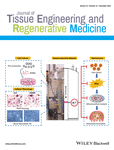16 T high static magnetic field inhibits receptor activator of nuclear factor kappa-Β ligand-induced osteoclast differentiation by regulating iron metabolism in Raw264.7 cells
Abstract
High static magnetic fields (HiSMFs) are usually defined as those SMFs with intensities ≥1 T. Although many studies have indicated that SMFs have positive effects on bone tissue, there were limited studies that investigate the effects of cells, including osteoclasts, to illustrate the effect of HiSMF on osteoclast differentiation, and whether iron involve in the altered osteoclast formation and resorption ability under HiSMF. 16 T HiSMF generated from a superconducting magnet was used. Osteoclastogenesis, bone resorption, acting ring formation, messenger ribonucleic acid expression, and protein expression were determined by tartrate-resistant acid phosphatase staining, pits formation assay, rhodamine-conjugated phalloidine staining, quantitative real-time polymerase chain reaction, and western blot, respectively. The changes induced by HiSMF in the level of iron and the concentration of mitochondrial protein, adenosine triphosphate, reactive oxygen species, malonaldehyde, and glutathione were examined by atomic absorption spectrometry and corresponding commercial kits, respectively. The results showed that HiSMF significantly inhibited osteoclastic formation and resorption ability and reduced cellular iron content during osteoclast differentiation. Mitochondrial concentration and oxidative stress levels in osteoclasts were decreased under HiSMF. Mechanistically, HiSMF markedly blocked the expression of osteoclast-associated transcription factors and osteoclast marker genes and inhibited iron absorption and iron storage-related protein expression. These findings demonstrated that the effect of HiSMF on iron metabolism of osteoclasts was involved in the inhibition of HiSMF on osteoclast differentiation.
CONFLICTS OF INTEREST
The authors report no conflicts of interest. The authors alone are responsible for the content and writing of the paper.




